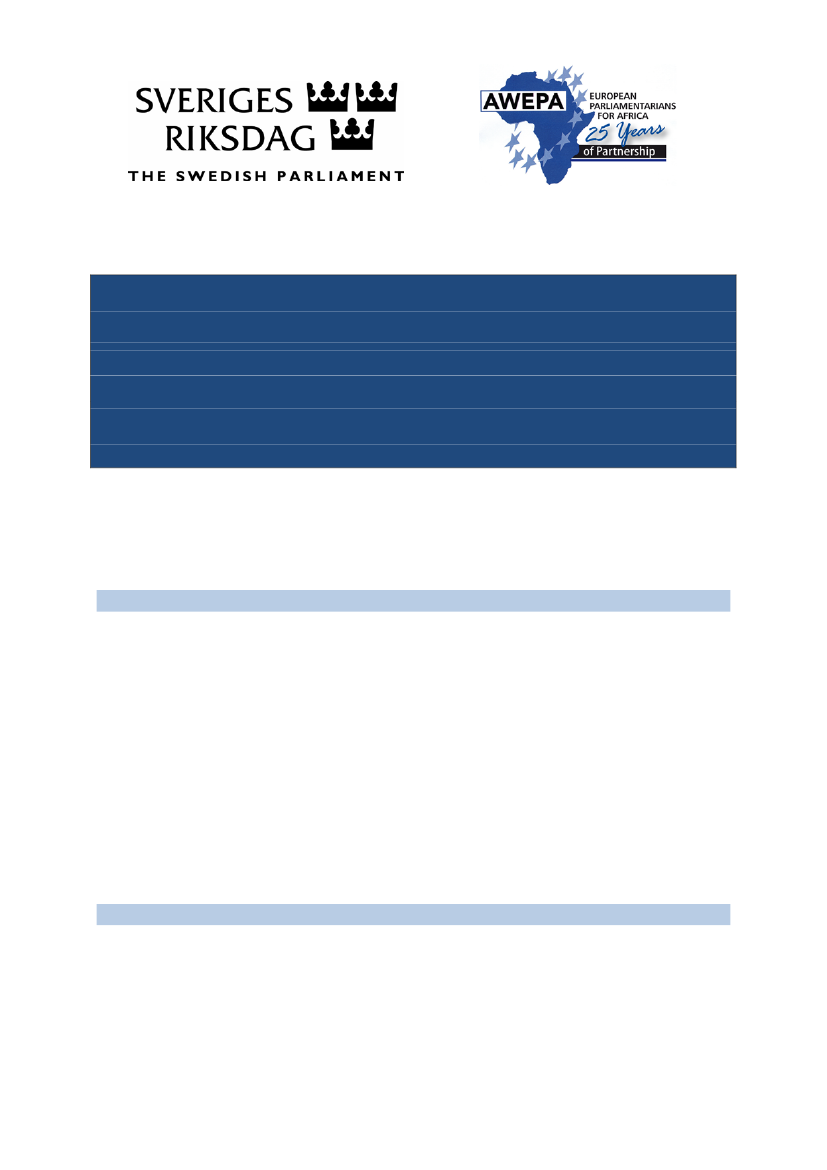Europaudvalget 2008-09
EUU Alm.del Bilag 446
Offentligt
Terms of Reference
EU Presidency Seminar“Promoting African-European Parliamentary Dialogue onClimate, Food Security and Development”19-21 August 2009, Stockholm, Sweden
The Association of European Parliamentarians for Africa (AWEPA) and the SwedishParliament will be hosting the EU Presidency Seminar titled “Promoting African-EuropeanParliamentary Dialogue on Climate, Food Security and Development”. This Seminar willfacilitate an open discussion about the interlinked issues of climate change and watermanagement.
BackgroundTwice yearly, AWEPA organises international parliamentary seminars, which coincide withthe rotating Presidency of the European Union. The main objectives of these seminarsinclude:•Assuring African priorities, in the context of NEPAD, are kept on the politicalagenda of the European Union (EU) and its member states;•Promoting partnerships between European and African (members of) parliamentsin order to strengthen parliamentary democracies; and•Supporting dialogue and networking for parliamentarians from Africa amongsteach other as well as with their colleagues from Europe to stimulate action for theachievement of the UN Millennium Development Goals (MDGs).Thus, AWEPA, together with its Section in the Swedish Parliament, is organizing an EUPresidency Seminar, which includes sessions in the Swedish Parliament and a side-eventduring theWorld Water Week(WWW). The WWW will take place in Stockholm from 16-22 August 2009 and is organised by the Stockholm International Water Institute (SIWI).
ThemesClimate Change
Linking up to one of Sweden’s presidency priorities, during the seminar and side-event,the topic of Climate Change will be addressed.Climate Change is one of the biggest challenges humanity has ever faced. At presentthere is an increased concern about the impacts of global Climate Change and calls forglobal justice. Whereas the North bears the largest responsibility for the causes of
Climate Change, the South, and especially Africa, will suffer the worst consequences,consequences that are now inevitable.AWEPA, together with the Pan-African Parliament, EALA, SADC Parliamentary Forum,ECOWAS Parliament, and other major actors in Africa, have launched the African-European Parliamentary Dialogue on Climate, Food Security and Development with thecommon aim of increasing the role of parliamentarians in the adaptation process toClimate Change.This parliamentary seminar aims to encourage debate and political action on the topics ofClimate Change in Africa leading up to the 2009 UN Climate Conference in Copenhagen inDecember 2009 (COP15).Water Management
Climate change is manifesting itself as a cross-cutting issue in need of a multi-facetedsolution. In this respect, this seminar will focus on water management, as this topic isstrongly interconnected with the challenge of climate change.Today some 300 million Africans have no access to safe drinking water, and 313 millionpeople lack basic sanitation1. This lack of water poses a serious problem to theenvironment and development of the continent, which is leading to serious repercussionsfor African food security. These challenges call for immediate attention.The overall focus of the discussions at the seminar will be on sharing knowledge andexploring suitable strategies for parliamentary action.Parliamentary Scrutiny of Development Aid
The third key area of parliamentary responsibility highlighted at the seminar isParliamentary scrutiny of development aid, with a particular focus on issues related toClimate Change and Water.The Paris Declaration on Aid Effectiveness, the Accra Agenda for Action (AAA) have allclearly recognised the vital role that parliaments play in enhancing the effectiveness ofaid, and in achieving progress towards the targets set in the 2005 Paris Declaration. Withan increase in General Budget Support (GBS) to partner countries seen throughout thedevelopment community, parliamentary capacity vis-à-vis the scrutiny of nationalbudgets and aid flows is in dire need of support.Therefore, the seminar aims to raise awareness amongst parliamentarians in both donorand partner countries on the importance of parliamentary advancement in this area andthe exchange of good practices in budgetary oversight.2009 World Water Week in Stockholm
The overarching theme of the World Water Week (WWW) 2009 is “Accessing Water forthe Common Good”, with a special focus on Trans-boundary Waters. A diverse range oftopics are put on the agenda related to agriculture, biodiversity, sanitation, climatechange, drinking water, finance, governance, poverty reduction, technology and waterresources management. The WWW provides a unique global platform for leaders in civilsociety, business and governments to confer and set up practical actions on thesechallenges.International Commission on Climate Change and Development (CCCD)
1
Africa has an estimated population of over 800 million.
2
The Swedish Government has established the International Commission on ClimateChange and Development (CCCD) with the aim to contribute to international efforts onadaptation to climate change and risk reduction. H.E. Gunilla Carlsson, Minister forinternational development cooperation is the Chairperson of the Commission.The work of the CCCD focuses on exploring the links between adaptation to climatechange and development. The Commission submitted its final report in May 2009 aheadof the Swedish Presidency of the EU and the 2009 Copenhagen United Nations ClimateChange Conference.The Final Report will focus on:•The human dimension of climate change: What do people need in order to adaptand how are they adapting already?•The institutional architecture: How can we best organize the plethora ofinstitutions involved in climate change to efficiently encourage adaptation, ingeneral and in accordance with the Paris declaration on aid effectiveness?•What are the financial and political prerequisites for the success of developingcountries in meeting their adaptation needs?•Resources and financing: what resources are needed and how can they best bemanaged?
Objectives•••To sensitize parliamentarians on the topics of Climate Change and WaterManagementTo mobilise Members of Parliament increase parliamentary action in Europe andAfrica related to Climate Change, and Water issuesIdentify parliamentary recommendations on Climate issues that will be send to the2009 UN Climate Conference in Copenhagen in December 2009 (COP15)
Outputs••Conference reportJoint parliamentary recommendations on Climate issues drafted by African andEuropean Parliamentarians
Outcomes••African and European Parliaments have more informed debates about climatechange, water and food securityAwareness amongst parliamentarians has been raised on good practices forscrutiny of the national budget with a particular focus on climate change, water,and issues of food security. Support for improving parliamentary capacity inbudgetary oversight is galvanised.Interaction between European and African parliamentarians continues through aParliamentary Dialogue on Climate Change, Food Security and Development
•
Participants & Resource Persons3
The seminar offers a platform for approximately 50 participants from Africa and Europe,consisting of representatives from the following:•••••••Members of regional and national African ParliamentsMembers of European ParliamentsMembers of the Swedish Parliamentary Committee on EnvironmentRepresentatives from Parliamentary Networks including the ParliamentaryNetwork of the World Bank (PNoWB), GLOBE and the NEPAD Contact Group ofAfrican ParliamentariansRepresentatives from various UN AgenciesRepresentatives from Civil Society OrganisationsSwedish Political Foundations
Host Organisations:•The Swedish Parliament•AWEPA
4




